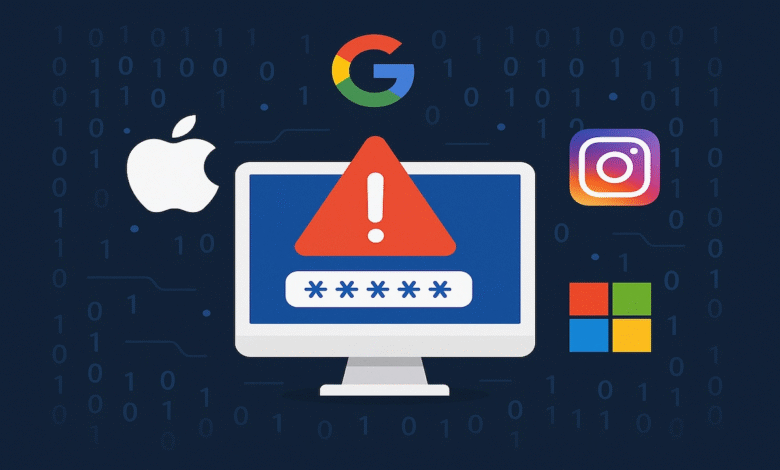Data Breach Exposes Password Problems — Solutions Ahead?

In the digital age, the alarming rise of data breaches has made headlines, with a recent incident exposing 16 billion login credentials, igniting widespread concern among internet users. This massive data leak not only raises questions about our reliance on passwords but also highlights the pressing need for a shift towards more secure authentication methods. Security experts stress that simply changing passwords won’t suffice in combating persistent cybersecurity threats, as these breaches can occur repeatedly. Instead, there is a compelling call for adopting a privacy-first approach that prioritizes decentralized identity systems. By moving away from centralized databases, we can enhance security and protect our sensitive information from falling into the hands of cybercriminals.
In recent months, significant security breaches have sparked discussions about the vulnerability of personal data and online accounts. With the recent compromise of billions of login details, it has become evident that the traditional reliance on passwords is being called into question. Experts advocate for a transformative shift in how we authenticate our identities online, suggesting that alternative methods could provide stronger security against cyber threats. Additionally, the conversation revolves around adopting a decentralized model that protects user privacy while maintaining access to necessary services. As we navigate this landscape, the push for more secure, innovative approaches to managing our digital identities takes center stage.
Understanding the Recent Data Breach Impact
The massive data breach that exposed 16 billion login credentials is unprecedented, making it imperative to revisit how we view password security. As internet users scramble to change their passwords, experts emphasize that merely changing passwords is a superficial response. This data breach is not just a statistic; it unveils a gaping flaw in our current reliance on centralized databases. When credentials from such breaches become available, they serve as a trove for cybercriminals, enabling rampant identity theft and facilitating a multitude of cybersecurity threats.
As security protocols continue to evolve, the traditional approach to password management is coming under scrutiny. Following this data breach, a deeper discussion on decentralized identity and alternative authentication methods is becoming more prominent. Password alternatives like biometric authentication and hardware tokens are emerging as potential replacements, yet they too come with their own set of vulnerabilities. Thus, the recent data breach serves as a catalyst for reevaluating the frameworks we use to safeguard our digital identities.
The Case for a Privacy-First Approach
In light of the data breach, experts advocate for a robust privacy-first approach that prioritizes the protection of user data over profit. This mindset encourages businesses to shift away from centralized storage of sensitive information, which is prone to exploitation. Instead, leveraging decentralized systems could minimize risks associated with data breaches, as these systems distribute data and make it significantly more challenging for cybercriminals to access it en masse.
Moreover, a shift to a privacy-first approach mandates that users regain control over their personal data. Innovations like decentralized identity can empower individuals, allowing them to manage their information without relying on third-party intermediaries. As we continue navigating a digital world filled with cybersecurity threats, embracing decentralization may provide a much-needed buffer against future breaches that threaten not just privacy, but the very structure of online trust.
The evolution of technological advancements necessitates an educational push towards understanding decentralized identity. As the paradigm shifts, …
Exploring Password Alternatives in a Digital Age
With the increasing awareness of cybersecurity threats, many are now exploring password alternatives that could potentially eliminate the need for traditional passwords altogether. Biometric options like fingerprint and facial recognition are gaining traction as they promise a more secure user verification process. However, while such technologies appear more convenient and efficient, they also raise concerns regarding data privacy and the potential for unauthorized access. The recent massive data leak adds urgency to this debate around verifying user identity without compromising personal information.
Furthermore, while passkeys have been touted as a means to remedy the flaws of conventional passwords, the reality remains complex. As pointed out by experts, passkeys often rely on cloud storage, which means they too might inherit the vulnerabilities tied to cloud-based systems. To truly shift away from passwords, innovations like Zero-Knowledge Proofs and sophisticated cryptographic systems must come to the forefront, redefining the landscape of digital security in a way that not only dispenses with passwords but provides a more reliable safety net against threats.
The Role of Decentralized Identity Solutions
Decentralized identity solutions represent a pivotal shift from traditional authentication mechanisms that have long dominated the online space. This model allows users to have direct control over their credentials without relying on centralized entities. The recent data breach underscores the potential downsides of centralized systems, where a single point of failure can lead to widespread credential theft. Adoption of decentralized identity frameworks can mitigate such risks, making it inherently more difficult for cybercriminals to compromise multiple accounts.
Moreover, the advantages of decentralized identity extend beyond just security. By putting users in charge of their information, we promote a privacy-first paradigm that encourages trust and transparency in digital interactions. As businesses begin recognizing these benefits, we might see a gradual shift in policy and practice, giving rise to more resilient cybersecurity infrastructures that prioritize user autonomy. This evolution not only safeguards individual privacy but could also foster a healthier digital environment overall.
Innovative Technologies for Enhanced Security
In the aftermath of severe data breaches, innovative technologies are gaining traction as essential components of a more resilient cybersecurity framework. Techniques such as Homomorphic Encryption and Zero-Knowledge Proofs (ZKPs) are being explored as viable alternatives to traditional data encryption. These technologies allow data to be processed while encrypted, meaning that unauthorized access can be circumvented even in the event of a breach. Such advancements can significantly boost confidence in digital transactions, enabling users to engage without fear of their credentials being compromised.
Additionally, cybersecurity threats are evolving, making it imperative for companies to stay ahead of potential exploits. As more organizations begin to integrate cutting-edge technologies, there’s an opportunity to design systems that inherently resist attacks. By advancing our understanding and application of these technologies, we can substantially decrease the incidence of data breaches and empower users to navigate the digital landscape with greater peace of mind.
Challenges in Implementing Decentralization
While the idea of decentralizing identity and data is gaining momentum, numerous challenges lie ahead. The implementation of decentralized systems requires substantial infrastructure changes, which can be costly and time-consuming. Additionally, there’s a prevailing lack of understanding among the general public regarding how to use decentralized systems safely and effectively. For the transition to be successful, it is crucial to emphasize user education and provide robust support systems to ease the shift from conventional identification methods.
Moreover, regulatory frameworks are often lagging behind technological advancements, creating further hurdles in adopting decentralized identity solutions. Governments and institutions may be hesitant to relinquish control over user data, leading to friction in the migration towards more user-centric models. Collaborative efforts between tech leaders, regulators, and consumers will be instrumental in overcoming these challenges, ensuring that privacy-first principles ultimately prevail.
The Future of Authentication Beyond Passwords
As discussions surrounding passwords intensify in the wake of massive data breaches, it’s evident that a future without passwords is not just a dream but a logical progression. Alternatives like decentralized identity could redefine how we authenticate online, emphasizing user control over data. The recent data breach has acted as a wake-up call, casting a spotlight on the inadequacies of relying solely on passwords in a digital age where authentication is a necessity for virtually every online interaction.
Furthermore, as we augment and innovate new authentication systems, it becomes essential to maintain compliance with privacy regulations and user consent. Future authentication solutions must prioritize personal trust and security while remaining easy to adopt and use. By prioritizing innovation alongside ethical considerations, we can foster a healthier digital ecosystem that appropriately balances user empowerment with robust protective measures against evolving cyber threats.
Learning from Past Breaches to Improve Security
Every massive data breach serves as a learning opportunity, providing insights into the failings of current security measures and the systems that underpin them. The recent compromise of 16 billion credentials can be looked at as a critical point for reevaluation of our strategies against cyber threats. By analyzing the vulnerabilities exploited during this breach, businesses can implement more sophisticated defenses that preemptively counteract potential attacks.
Moreover, sharing lessons learned from such breaches can foster a culture of collaboration among organizations. Cybersecurity experts emphasize the importance of transparency and information sharing to combat common threats effectively. By building a network of knowledge surrounding data protection, we can bolster our defenses and reduce the incidence of successful breaches, ultimately leading to a more secure online environment for users.
The Importance of Continuous Monitoring in Cybersecurity
Continuous monitoring has emerged as a cornerstone of effective cybersecurity strategies. In an era marked by frequent and severe data breaches, it is no longer adequate to implement security measures and then forget about them. Organizations need to remain vigilant and use real-time monitoring tools to detect anomalies, track unauthorized access attempts, and respond swiftly to potential threats.
By integrating monitoring systems with AI and machine learning capabilities, companies can enhance their defensive measures. These technologies can analyze patterns and predict breaches before they occur, allowing organizations to take proactive rather than reactive stances against cyber threats. The importance of continuous vigilance in the face of evolving security concerns cannot be overstated, as it ultimately safeguards both user privacy and corporate integrity.
Frequently Asked Questions
What are the main concerns following a data breach involving 16 billion login credentials?
The recent data breach exposing 16 billion login credentials has raised significant concerns about the security of personal data and the vulnerability of centralized databases. Cybercriminals can exploit these leaked credentials for identity theft, phishing attacks, and unauthorized system access, heightening fears among internet users about the safety of their online accounts.
How does a privacy-first approach help prevent future data breaches?
Adopting a privacy-first approach can mitigate the risks associated with future data breaches by reducing reliance on centralized databases. This model emphasizes decentralization, ensuring sensitive user data is stored securely and directly controlled by individuals, thus lowering the likelihood of mass exploitation in case of a breach.
What alternatives exist to traditional passwords following a massive data leak?
Following the massive data leak, experts suggest transitioning to alternatives such as decentralized identity systems, Zero-Knowledge Proofs (ZKPs), and cryptographic tools. These methods provide security without the inherent risks of traditional passwords, enabling user-controlled access without exposing sensitive information.
What role do decentralized identity systems play in cybersecurity?
Decentralized identity systems enhance cybersecurity by allowing users to manage their credentials independently of centralized organizations. By reducing the dependency on traditional infrastructures that can be targeted in data breaches, these systems promote a privacy-first approach to securing personal information.
How can decentralization help combat the threats posed by massive data leaks?
Decentralization can combat the threats from massive data leaks by eliminating single points of failure where sensitive information is concentrated. By using methods like decentralized data storage and encryption, individuals can protect their credentials and maintain control over their personal data, making it less accessible to cybercriminals.
Why are traditional password recovery methods considered inadequate after a data breach?
Traditional password recovery methods are considered inadequate after a data breach because they typically rely on compromised accounts to restore access. This circular dependency can expose users to further risks, as attackers can exploit recovery techniques that often lead back to the initial security vulnerabilities.
What advanced technologies can enhance security in light of recent data breaches?
Technologies such as Zero-Knowledge Proofs (ZKPs) and Homomorphic Encryption are advanced methods that can enhance security post-data breach. These technologies allow data to be validated without needing to be decrypted, thereby improving privacy while maintaining access control.
What is the importance of adopting a privacy-first mindset in the age of AI?
In the AI era, adopting a privacy-first mindset is crucial as automation increases the risks of data breaches and exploitation. By transitioning to self-sovereign and permissioned privacy models, individuals and organizations can better protect their data and navigate the complexities introduced by AI-driven technologies.
| Key Points | Details |
|---|---|
| Massive Data Breach | 16 billion login credentials compromised. |
| Call for New Paradigm | Experts suggest abandoning centralized databases for decentralized systems. |
| Concerns About Passwords | Traditional password reliance is questioned; alternatives are needed. |
| Decentralized Solutions | Innovations like Zero-Knowledge Proofs and Homomorphic Encryption as potential fixes. |
| Risks of Data Exploitation | Leaked data poses risks of identity theft, phishing, and system breaches. |
| Challenges Ahead | Adoption of privacy-first approaches by businesses, governments, and users is critical. |
Summary
Data breaches continue to pose significant risks to internet security, as evidenced by the exposure of 16 billion login credentials. With the convenience of password reliance fading, experts advocate for a transformative shift towards decentralized solutions that prioritize user privacy. Embracing a privacy-first mindset is essential, especially in an age where cyber threats are more sophisticated than ever. The call to action lies not just in changing passwords but in rethinking how we store and manage sensitive information to safeguard against future breaches.




